using castor oil for moles/gophers, bad for garden?
oklahomegrown
7 years ago
Featured Answer
Sort by:Oldest
Comments (13)
Related Discussions
Is Castor Oil completely safe to use in the garden?
Comments (20)My husband, and I live on 20 acres 11 miles outside of Bend OR. Voles have destroyed our lawn my husband has flooded the holes w/water, he's loosened them, he even started shooting them with his 410 shot gun. I started a butterfly/hummingbird garden last year, and everyday I'd go out to work, and they had feasted the night before. I bought just regular Castor Oil (consumable by humans) I put it into a sprayer, diluted it just enough so it wouldn't clog, and went out and sprayed the plants in my garden. It's only been a couple of days, and so far I haven't seen any. I even poured pure Castor Oil around the base of the plants. My husband is going to spray out lawn, and I suggested that we pour undiluted Castor Oil into the holes. We don't have a lot of lawn around our house, just enough to enjoy. I'll keep you posted. I'm going to be starting my veggie garden soon, and I'm goings to use the same process. I hope this helped !...See Morecastor bean plants and moles/gophers
Comments (16)2 years ago the gophers took over our backyard and we tried everything everyone told us including the BB gun,all to no avail.Then dh heard someone on the radio say to go to the Mexican market,get the hottest peppers they sell,and drop them down the holes(wear gloves to do this).He did it and the gophers left.Thank goodness,as we were going crazy trying to stay ahead of them.Before dh heard that he had gone out and bought lots of pots from great big ones to small ones and dug up all our lilies,iris's etc and planted them in pots. So far this year we havn't seen any ,thank God. Kathi...See MoreWhere can I buy Castor Oil ?
Comments (29)Greenstar, I don't wish to be mean but your remarks are inflammatory and do not contribute to the conversation. "You don't go out and start killing animals on your property when you don't even have a clue what the problem is" If a taxonomic classification is required to shoot a nuisance animal that is standing next to the hole it made, they should teach biology instead of hunters' safety. I don't think what VRG is shooting is endangered. I don't think PG is having his or her garden damaged by whooping cranes. The fact that rural folks choose to call pocket gophers "moles" is slightly confusing but does not make the problem imaginary. "I don't have a problem with control of moles, voles, pocket gophers, Richardson ground quirrels, etc. but the ignorance of a solution 'not working' and 'what can I do next' is disturbing when the 'enemy' isn't even properly identified". The smoke cartridges and castor oil granules are marketed for control of all burrowing pests. So are the traps. If they aren't effective, of course the poster is going to look for another solution. That's why we have a forum. "As for the numbers of 'moles' described and their damage..it's a gross exaggeration." Speak for yourself. "Our property is prime Richardson ground squirrel, vole, mouse, etc. territory yet we have a great garden, no collapsing earth" Lucky you....See MoreTunneler ID please: Mole, gopher, mole cricket, shrew, or vole (p
Comments (16)Don't get your knickers in a twist, kimmsr! lol...you just left out part of the helpful information. Actually, plain water and castor oil won't make an emulsion either, but a bit of soap would help the process. By the way, ladybugfalcon, the castor oil treatments really can help...unlike some of the other 'home remedies' you've heard of. I really like the chewing gum fable. I've heard that it MUST be Juicy Fruit, though different sources dictate that either needs to be chewed up a bit OR that it must never touch human hands. What a riot. Most people, however, find that mole traps are very effective, once you get the hang of them. They aren't for everybody, though. Unless you fear that you have a severe problem, you could simply keep the tunnels stamped down and hope that they lose interest in your yard. A few mole visits don't necessarily mean that you have to take action....See Morenowyousedum
7 years agooklahomegrown
7 years agoOkiedawn OK Zone 7
7 years agobossyvossy
7 years agoNancy RW (zone 7)
7 years agoNancy RW (zone 7)
7 years agoOkiedawn OK Zone 7
7 years agoNancy RW (zone 7)
7 years agooklahomegrown
7 years agoOkiedawn OK Zone 7
7 years ago
Related Stories

LANDSCAPE DESIGN10 Ways to Use Artificial Turf Where It Actually Looks Good
Fake grass is not for everyone, but it can be a problem-solver on balconies, on driveway strips and in urban courtyards
Full Story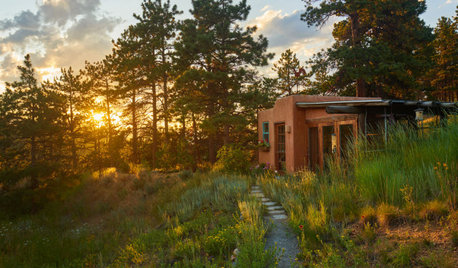
EARTH DAY12 Sustainable Gardening Ideas From Landscape Design Pros
Create a more earth-friendly garden by planting for pollinators, ditching pesticide use and more
Full Story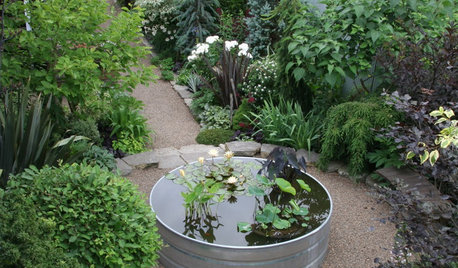
LANDSCAPE TRENDSStock Tank Style: The Garden and Patio Edition
Galvanized-metal water troughs bring hardworking style to patios, plantings, fountains and ponds
Full Story
FALL GARDENING7 Reasons Not to Clean Up Your Fall Garden
Before you pluck and rake, consider wildlife, the health of your plants and your own right to relax
Full Story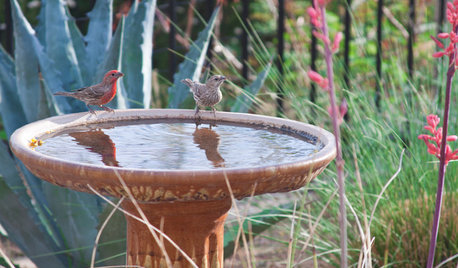
GARDENING GUIDESMake Your Garden a Haven for Backyard Birds
Create a bird-friendly habitat in your yard with food, water and shelter
Full Story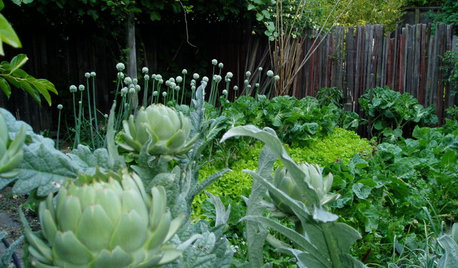
FRONT YARD IDEAS10 Ideas for a Front-Yard Edible Garden Your Neighbors Will Love
Choosing attractive, well-mannered plants and sharing the bounty will go a long way toward keeping the peace
Full Story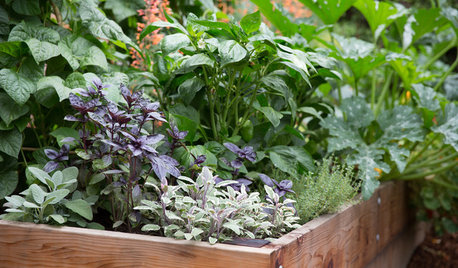
GARDENING 10110 Steps to Get Your Edible Garden Started
Set veggies, fruits and herbs up to thrive by choosing a spot in full sun, amending soil, addressing drainage and more
Full Story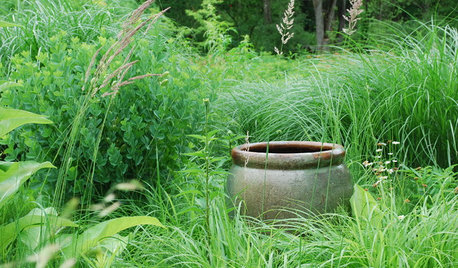
GARDENING GUIDES5 Invaluable Life Lessons From the Garden
The garden is both teacher and healer. Don't be afraid — dig in and reap the benefits
Full Story
EDIBLE GARDENSHow to Grow Your Own Sweet Summer Crops
This guide will help any gardener get started on growing the freshest warm-season veggies and berries for summer
Full Story
LIFEHow to Outsmart Backyard Critters
Learn to think like a raccoon, skunk or squirrel to keep your home safe and your garden intact
Full StoryMore Discussions




LoneJack Zn 6a, KC